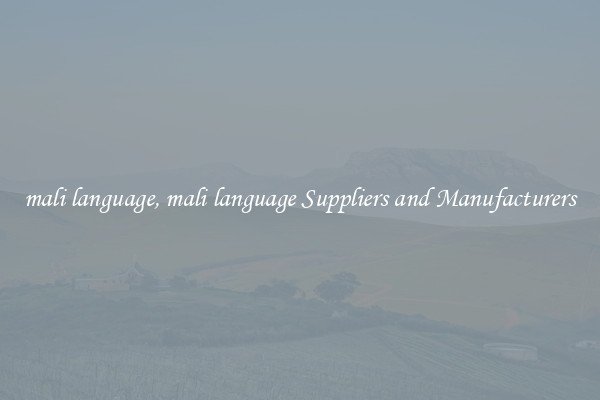mali language, mali language Suppliers and Manufacturers
The Malian language, also known as Bambara, is the most widely spoken language in Mali. It is primarily spoken by the Bambara ethnic group, which constitutes the largest ethnic group in the country. The language is also spoken by other ethnic groups such as the Malinke, Soninke, and Dioula.

The Malian language belongs to the Niger-Congo language family and is classified as a Manding language. It is closely related to other Manding languages spoken in countries such as Guinea, Burkina Faso, and Senegal. However, due to its wide usage and official recognition in Mali, the Bambara language has developed uniquely with its own grammar, vocabulary, and dialects.
Mali, being a multilingual country with more than 20 languages spoken, recognizes the importance of preserving and promoting indigenous languages. This has led to the establishment of several organizations and initiatives focused on the development and growth of the Malian language.
Mali language suppliers and manufacturers play a crucial role in the preservation and promotion of the Malian language. They provide a wide range of products and services that cater to the needs of the Malian-speaking population.
One of the primary areas where suppliers and manufacturers contribute is in the production of educational materials. They develop textbooks, dictionaries, and other learning resources that are essential for teaching and learning the Malian language in both formal and informal settings. These materials help in improving literacy rates and ensuring that the language is passed on to future generations.
Mali language suppliers and manufacturers also provide translation and interpretation services. With the increasing globalization and international interactions, there is a growing demand for translating documents, websites, and other content into the Malian language. These services are essential for promoting the use of the language in various sectors such as business, tourism, and government.
Furthermore, suppliers and manufacturers of the Malian language contribute to the technological advancement of the language. They develop software applications, keyboards, fonts, and other digital tools to make it easier to type, write, and communicate in Bambara. These advancements help in integrating the language into the digital world and make it more accessible to speakers and learners.
In conclusion, the Malian language holds great importance in the cultural and social fabric of Mali. Its suppliers and manufacturers play a pivotal role in preserving and promoting the language through the production of educational materials, translation services, and technological advancements. By supporting these efforts, the Malian language can continue to thrive and be a source of pride for the people of Mali.

View details

View details

View details

View details








